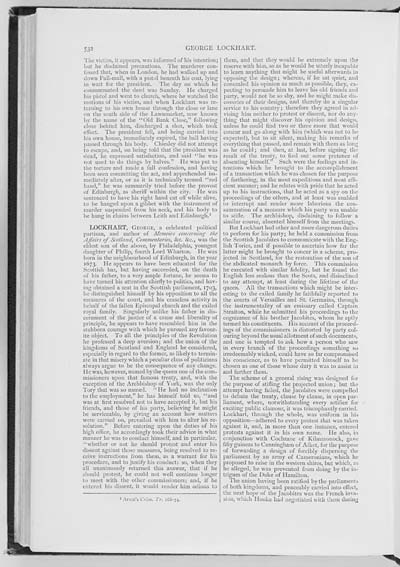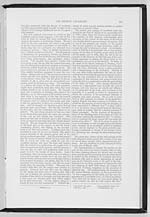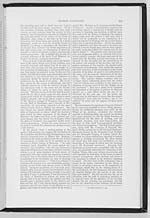532
The victim, it appears, was informed of his intention;
but he disdained precautions. The murderer con-
fessed that, when in London, he had walked up and
down Pall-mall, with a pistol beneath his coat, lying
in wait for the president. The day on which he
consummated the deed was Sunday. He charged
his pistol and went to church, where he watched the
motions of his victim, and when Lockhart was re-
turning to his own house through the close or lane
on the south side of the Lawnmarket, now known
by the name of the "Old Bank Close," following
close behind him, discharged a shot, which took
effect. The president fell, and being carried into
his own house, immediately expired, the ball having
passed through his body. Chiesley did not attempt
to escape, and, on being told that the president was
dead, he expressed satisfaction, and said "he was
not used to do things by halves." He was put to
the torture and made a full confession, and having
been seen committing the act, and apprehended im-
mediately after, or as it is technically termed "red
hand," he was summarily tried before the provost
of Edinburgh, as sheriff within the city. He was
sentenced to have his right hand cut off while alive,
to be hanged upon a gibbet with the instrument of
murder suspended from his neck, and his body to
be hung in chains between Leith and Edinburgh.1
LOCKHART, GEORGE, a celebrated political
partisan, and author of Memoirs concerning the
Affairs of Scotland, Commentaries, &c. &c., was the
eldest son of the above, by Philadelphia, youngest
daughter of Philip, fourth Lord Wharton. He was
born in the neighbourhood of Edinburgh, in the year
1673. He appears to have been educated for the
Scottish bar, but having succeeded, on the death
of his father, to a very ample fortune, he seems to
have turned his attention chiefly to politics, and hav-
ing obtained a seat in the Scottish parliament, 1703,
he distinguished himself by his opposition to all the
measures of the court, and his ceaseless activity in
behalf of the fallen Episcopal church and the exiled
royal family. Singularly unlike his father in dis-
cernment of the justice of a cause and liberality of
principle, he appears to have resembled him in the
stubborn courage with which he pursued any favour-
ite object. To all the principles of the Revolution
he professed a deep aversion; and the union of the
kingdoms of Scotland and England he considered,
especially in regard to the former, as likely to termin-
ate in that misery which a peculiar class of politicians
always argue to be the consequence of any change.
He was, however, named by the queen one of the com-
missioners upon that famous treaty, and, with the
exception of the Archbishop of York, was the only
Tory that was so named. "He had no inclination
to the employment," he has himself told us, "and
was at first resolved not to have accepted it, but his
friends, and those of his party, believing he might
be serviceable, by giving an account how matters
were carried on, prevailed with him to alter his re-
solution." Before entering upon the duties of his
high office, he accordingly took their advice in what
manner he was to conduct himself, and in particular,
"whether or not he should protest and enter his
dissent against those measures, being resolved to re-
ceive instructions from them, as a warrant for his
procedure, and to justify his conduct: so, when they
all unanimously returned this answer, that if he
should protest, he could not well continue longer
to meet with the other commissioners; and, if he
entered his dissent, it would render him odious to
1 Arnot's Crim. Tr. 168-74.
them, and that they would be extremely upon the
reserve with him, so as he would be utterly incapable
to learn anything that might be useful afterwards in
opposing the design; whereas, if he sat quiet, and
concealed his opinion as much as possible, they, ex-
pecting to persuade him to leave his old friends and
party, would not be so shy, and he might make dis-
coveries of their designs, and thereby do a singular
service to his country; therefore they agreed in ad-
vising him neither to protest or dissent, nor do any-
thing that might discover his opinion and design,
unless he could find two or three more that would
concur and go along with him (which was not to be
expected), but to sit silent, making his remarks of
everything that passed, and remain with them as long
as he could; and then, at last, before signing the
result of the treaty, to find out some pretence of
absenting himself." Such were the feelings and in-
tentions which he brought to the accomplishment
of a transaction which he was chosen for the purpose
of furthering, in the most expeditious and most effi-
cient manner; and he relates with pride that he acted
up to his instructions, that he acted as a spy on the
proceedings of the others, and at least was enabled
to interrupt and render more laborious the con-
summation of a measure which his party was unable
to stifle. The archbishop, disdaining to follow a
similar course, absented himself from the meetings.
But Lockhart had other and more dangerous duties
to perform for his party; he held a commission from
the Scottish Jacobites to communicate with the Eng-
lish Tories, and if possible to ascertain how far the
latter might be brought to concur in a scheme, pro-
jected in Scotland, for the restoration of the son of
the abdicated monarch by force. This commission
he executed with similar fidelity, but he found the
English less zealous than the Scots, and disinclined
to any attempt, at least during the lifetime of the
queen. All the transactions which might be inter-
esting to the exiled family he faithfully reported to
the courts of Versailles and St. Germains, through
the instrumentality of an emissary called Captain
Straiten, while he submitted his proceedings to the
cognizance of his brother Jacobites, whom he aptly
termed his constituents. His account of the proceed-
ings of the commissioners is distorted by party col-
ouring beyond the usual allotment of such documents,
and one is tempted to ask how a person who saw
in every branch of the proceedings something so
irredeemably wicked, could have so far compromised
his conscience, as to have permitted himself to be
chosen as one of those whose duty it was to assist in
and further them.
The scheme of a general rising was designed for
the purpose of stifling the projected union; but the
attempt having failed, the Jacobites were compelled
to debate the treaty, clause by clause, in open par-
liament, where, notwithstanding every artifice for
exciting public clamour, it was triumphantly carried.
Lockhart, through the whole, was uniform in his
opposition�adhered to every protest that was taken
against it, and, in more than one instance, entered
protests against it in his own name. He also, in
conjunction with Cochrane of Kilmaronock, gave
fifty guineas to Cunningham of Aiket, for the purpose
of forwarding a design of forcibly dispersing the
parliament by an army of Cameronians, which he
proposed to raise in the western shires, but which, as
he alleged, he was prevented from doing by the in-
trigues of the Duke of Hamilton.
The union having been ratified by the parliaments
of both kingdoms, and peaceably carried into effect,
the next hope of the Jacobites was the French inva-
sion, which Hooke had negotiated with them during

![]() Universal Viewer |
Universal Viewer | ![]() Mirador |
Large image | Transcription
Mirador |
Large image | Transcription
![]()

